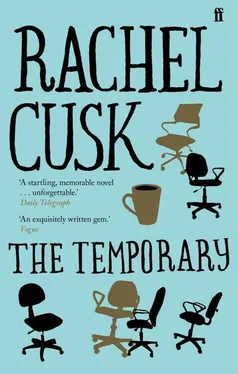‘Soon,’ he said kindly, like a mother. He considered putting an arm around her. ‘Have you warmed up a bit?’
She didn’t reply, catching a dark strand of hair and twirling it amongst her fingers. Her face was lowered, absorbed in something at which he did not want to guess, and he felt the sudden tug of her inescapability. It lay like a leash about his neck, forgettable sometimes, but always tightening when he strained at it.
‘We’ll have supper and then you can go to bed,’ he said. A feeling of despair martyred him. ‘I’ll move the television into the bedroom if you like.’
‘I don’t want to go to bed! I want to talk! You said we’d talk.’
‘All right,’ he said. His sympathy knocked aside, sent carelessly scurrying like a leaf as her words sped unstoppably along the immutable grooves of habit, he felt unutterably weary. ‘Go and sit down. I’ll be there in a minute.’
*
It had only just started to rain, but the sudden outburst was so fierce that long, glassy streaks were already pouring down the window-pane, vainly carving their writhing currents on its surface. Ralph watched the mesmeric patterns of flow, his heart quieted by this generosity of water, its sympathy with him. Francine sat on the other side of the table. She too, he felt, was becalmed by the rain, and a rare harmony was growing between them; not of concupiscence, Heaven knew, but a fragile accord which seemed to have arisen from a silent admission of shared trouble. He had cleared away the wreckage of dinner and had lit candles, not through any desire to set a scene, but rather in honour of this sudden deluge of softness from which he wished to gain nothing but an interlude of peace between their noisy acts. Francine’s face opposite him was unusually unconscious, for once not busy with intentions; rather solemn and pale, in fact. Her features seemed more real to him like that, and he studied the miraculous way in which their lines composed beauty. He wondered, as he had done countless times before, how the genius of her design could merely be a felicity of surfaces, a lucky stroke from the hand of an inferior artist. He had used to think, of course, that such a face must have emanated from the heart, and even though he had since seen the rougher clay beneath its glaze, its riddle still had the power to beguile him.
‘Do you ever wish you had brothers and sisters?’ he said, suddenly wanting to hear her speak.
She looked bemused by his question, and he almost laughed aloud at how much impossibility was written in that sulky, incomprehending glance, what a bitter death it would be to live beneath it.
‘I don’t know,’ she said finally.
‘I used to be desperate for them,’ he said gaily. ‘I used to invent them, in fact.’
‘I suppose I used to do that,’ said Francine. She appeared surprised at the memory. ‘I don’t really remember.’
‘What are your parents like?’ said Ralph.
‘My mum and dad? Why do you want to know?’
‘Oh — just interested, that’s all.’
‘They’re normal.’ She sounded slightly affronted, as if his interest in her parents were unnatural.
‘Do you look like them?’
‘No. My dad’s got a beard.’
Ralph began to laugh encouragingly, thinking her reply hilarious, but she looked at him so strangely that he stopped.
‘What about your mother?’
‘What, you mean what does she look like? I don’t really know. Normal, I suppose.’
‘Do you see them often?’ he persisted.
‘Oh, they’re boring.’ She dismissed them with a wave of the hand. ‘They never do anything, except my mum goes to aerobics and my dad has his night out at the pub every Thursday. It’s not exactly exciting. They always say they’ll come up, but they never do.’ She sighed. ‘They don’t understand why I live in London.’
‘Why do you live here?’ said Ralph.
He didn’t really know why he had asked the question, but he suddenly found himself wanting its answer. Francine’s eyebrows furrowed, as if she were trying to decide whether he was joking.
‘Everyone lives here,’ she said.
They were silent for a while and Ralph noticed that the rain had stopped. In its hush he felt again their hopelessness, and the panic which had momentarily been driven away burst back into his thoughts. As he bore it once more he realized how much he longed to be clear of their endless, muddled communications, their intimate bureaucracy before which he knew his own poverty and powerlessness, to rise above it and gulp down drafts of honesty and sense. He felt his anchor lodged in rock, jammed deep down in the blackest and most inaccessible cave of fear. He had to get out of this — he had to! He caught Francine’s eye and she gave him an unnerving look, a look which seemed to have rounded up his thoughts and calmly admonished him for them. He saw her confidence, the fastness of her locks. Surely he could outwit her! He reasoned with himself while panicked seconds passed. He was beginning at least to understand with what force Francine’s reactions held sway over her initiatives. She required the greatest delicacy in her handling, and although at that moment he was gripped by a violent urge to rip that part of himself she owned from within her, the fortresses of her flesh, he knew, could only be negotiated by cunning.
‘Do you want anything?’ he said, half standing in anticipation of a pretext to go to the kitchen and be alone.
‘You know what I want.’ She looked rather pleased with her own reply, as if she had been awaiting a cue to deliver it. Ralph sat down again. His head began abruptly to ache. ‘I want to talk,’ she added after a pause, which she had evidently expected him to fill.
‘What about?’
He looked at her with what he judged to be an expression of polite interest. He knew he was being cruel, but at that moment it seemed like the only liberty he had.
‘God!’ She implored the ceiling with her eyes. ‘That’s so typical .’
‘Sorry.’
‘I mean, you act like this is just my problem. It’s like you don’t even care.’
‘I’m sorry.’
‘It’s like you want to pretend it’s not happening. You never even want to talk about it!’
‘Well, what is there to talk about?’ said Ralph. He realized amazedly that his behaviour had been aptly surmised. ‘I was just trying to be nice. I didn’t know you wanted to talk about it any more. You gave me the impression that you’d decided everything.’
‘I’m allowed to change my mind, aren’t I?’ she said. ‘It’s not against the law, is it?’
She stared at him provocatively, a vague smile twisting her lips, and for the first time, without really expecting it, he experienced such a wrench of resistance that his skin abruptly flamed and his heart seemed to fly from his chest. For a moment he could not ascertain what it meant: it was as if he had been told that he would suffer pain, and then been made to wait so long for it that when it came, it felt not like pain at all but reassurance.
‘Have you changed your mind?’
‘Maybe.’ She fiddled with something on the table. ‘I don’t know.’
He opened his mouth but found that he didn’t have anything to say. Something strained at the locks and bolts of his thoughts and grew frantic, pounding at its walls. He fought it back, panicked by the things he might feel if he let it out. It wasn’t up to him! It had nothing to do with him, none of it! Disturbance sang through his veins, and with it every part of him seemed to find its note, loud as the keys of a piano. He chorused silently his own despair. Francine was watching him now, waiting to see what he would do. He saw himself quite clearly lunging across the table and clawing at her plump cheeks with his blunt, innocuous fingers.
Читать дальше












